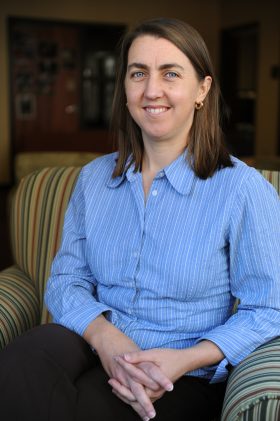It’s a common view among feminists that in today’s society, women are frequently depicted in advertising, art and media as little more than sex “objects” for men. But is that the right description? Ann J. Cahill, a professor of philosophy, doesn’t think so, and her new book Overcoming Objectification: A Carnal Ethics offers an evolved viewpoint for critiquing the portrayal of women in the 21st century.
Published in December by Routledge, the book explores an emerging theoretical approach to feminist thinking in which women aren’t considered objects so much as they’re restrained from reaching their full potential by conforming themselves to how straight men define sexuality.
That’s a key difference, Cahill said in a recent interview. She gave the following example: When it comes to relationships, an oft-repeated refrain is “to look past” appearances “to see the real person.” But that’s impossible, Cahill said, because the body inherently plays a role in how people perceive themselves.
The problem with the notion of objectification, Cahill says, is that it seems to assume that the body is separate from the self, and that to treat a person as a body is degrading.
Cahill argues that the problem with the way women’s bodies are represented is not that they’re treated as things. Instead, Cahill makes the case that women are “derivatized.” “They are encouraged, and in some cases required, to take on identities that are reducible to male heterosexual desires,” Cahill said.
In other words, women are only allowed to be the kinds of persons that heterosexual men find appealing and acceptable.That itself is unethical, she says, and her book delves into the concept by examining how such a philosophical framework allows scholars to reexamine such persistent ethical problems as sex work, sexual violence, and the often harmful ways in which women’s bodies are conveyed in images.
Routledge published Overcoming Objectification as part of its Research in Gender and Society series. Cahill’s first book, Rethinking Rape, was published by Cornell University Press in 2001. Rethinking Rape drew from Cahill’s dissertation at State University of New York at Stony Brook, from which she earned her doctorate in 1998.

Cahill has been the recipient of several research grants since joining the Elon faculty out of SUNY-Stony Brook, including five summer fellowships awarded by the Faculty Research and Development Committee at Elon. She was named a CATL Scholar for 2010-2012 for her project, “Argumentation Step-by-Step,” which further develops an innovative, learning-centered approach to teaching argumentation and transforms that pedagogy into a web-based curriculum to be shared with instructors at other institutions.
Cahill has presented her work at dozens of professional conferences, and she has published two co-edited volumes and multiple articles. She has chaired the Department of Philosophy since 2008 and the Sexual Assault and Gender Issues Council since 2006.
A member of the American Philosophical Association and the Society for Women in Philosophy, as well as Feminist Ethics and Social Thought and the American Association of Philosophy Teachers, she specializes in feminist theory and philosophy of the body.



